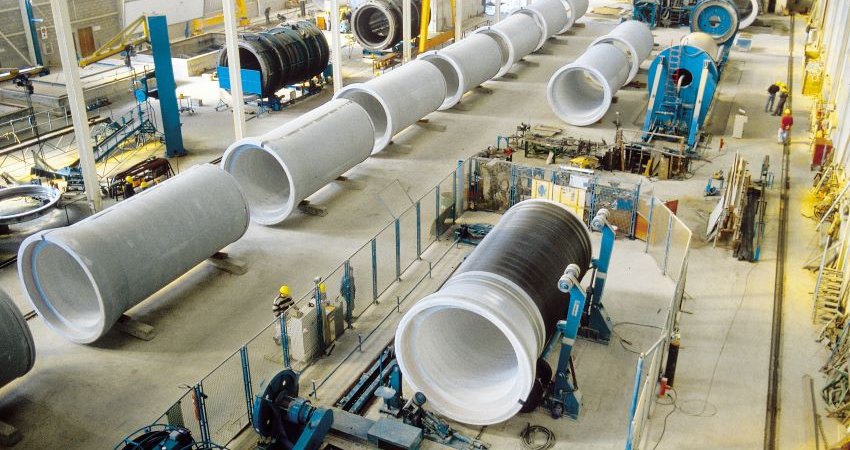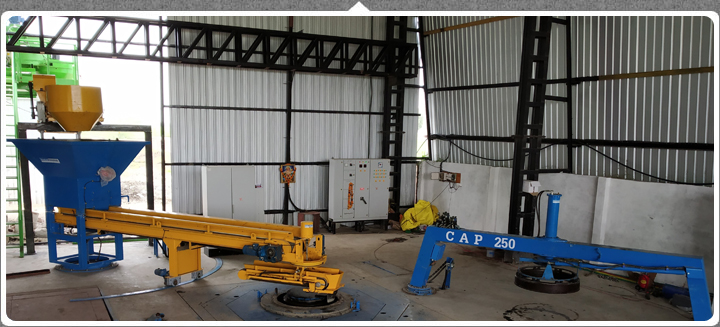
Concrete pipes have been a cornerstone of modern infrastructure for decades, playing a critical role in drainage, sewage, and water management systems. The choice between reinforced and non-reinforced concrete pipes depends on the project's structural and environmental demands. This article delves into the science behind these two types of concrete pipes, the technology used in their manufacturing, and the importance of advanced equipment like the concrete pipe making machine in India and beyond.
Introduction to Concrete Pipes
Concrete pipes are cylindrical structures made from a mixture of cement, aggregates, and water. They are used in a variety of applications, including:
- Storm water drainage.
- Sewer systems.
- Culverts and irrigation channels.
Two primary categories of concrete pipes exist: reinforced and non-reinforced. The distinction lies in their structural design and the presence or absence of reinforcement materials.

Non-Reinforced Concrete Pipes
Non-reinforced concrete pipes rely solely on the inherent strength of concrete to bear loads. These pipes are typically used in low-load conditions, such as small drainage systems or areas with minimal traffic.
Characteristics:
- Made without steel reinforcement.
- Depend on the compressive strength of concrete.
- Cost-effective for light-duty applications.
Applications:
- Agricultural drainage.
- Low-pressure sewer systems.
Advantages:
- Simple manufacturing process.
- Lower cost compared to reinforced pipes.
- Easy to install in areas with minimal load requirements.
Limitations:
- Limited structural strength.
- Not suitable for high-traffic or high-pressure applications.
Reinforced Concrete Pipes
Reinforced concrete pipes incorporate steel reinforcement, enhancing their ability to bear heavy loads and withstand extreme conditions. These pipes are the go-to choice for most large-scale infrastructure projects.
Characteristics:
- Include steel cages or mesh for added tensile strength.
- Designed to handle high loads and pressure.
- Manufactured using advanced concrete pipe making machinery.
Applications:
- Urban drainage systems.
- High-pressure sewage pipelines.
- Bridges, culverts, and tunnels.
Advantages:
- Superior load-bearing capacity.
- Longer lifespan.
- Resistance to cracking and deformation.
Limitations:
- Higher production costs.
- More complex installation process.
Manufacturing Process: Reinforced vs. Non-Reinforced Pipes
The manufacturing process for both types of pipes differs due to the inclusion of reinforcement in RCPs.
Non-Reinforced Pipe Manufacturing:
- Mixing: A combination of cement, water, and aggregates is mixed to achieve the desired consistency.
- Molding: The mixture is poured into cylindrical molds.
- Curing: Pipes are cured to enhance their strength and durability.
- Remolding: Once cured, the pipes are removed from molds and finished.
Reinforced Pipe Manufacturing:
- Reinforcement Setup: Steel cages or mesh are prepared and positioned in molds.
- Concrete Pouring: Concrete is poured around the reinforcement.
- Compaction: Machines compact the mix to eliminate air gaps and ensure uniformity.
- Curing: Curing enhances both the concrete and reinforcement bond.
- Finishing: Final finishing ensures smooth surfaces and accurate dimensions.
Role of Concrete Pipe Making Machines
The advent of advanced concrete pipe making machines has revolutionized the manufacturing process. These machines ensure precision, efficiency, and scalability, meeting the demands of modern infrastructure projects.
Features of Modern Concrete Pipe Machines:
- Automation: Reduces human error and increases production speed.
- Flexibility: Handles the production of both reinforced and non-reinforced pipes.
- Durability: Built to withstand the demands of continuous operation.
- Customization: Configurable for different pipe sizes and specifications.
Concrete Pipe Making Machine in India
India is a growing hub for infrastructure development, and the demand for efficient pipe-making equipment is rising. Indian manufacturers are producing state-of-the-art machinery to cater to both domestic and international markets.
Advantages of Using Concrete Pipe Making Machinery
- Precision: Ensures accurate pipe dimensions and consistent quality.
- Efficiency: Reduces production time and operational costs.
- Versatility: Supports the manufacturing of a wide range of pipe types.
- Sustainability: Machines are designed to minimize waste and energy consumption.
Choosing the Right Concrete Pipe Type
Selecting between reinforced and non-reinforced pipes depends on several factors:
1. Load Requirements
- Use non-reinforced pipes for low-load conditions like agricultural drains.
- Opt for reinforced pipes in high-load applications.
2. Project Scale
- Small-scale projects can benefit from the cost savings of non-reinforced pipes.
- Large-scale infrastructure requires the durability of reinforced pipes.
3. Budget Considerations
- Non-reinforced pipes are more affordable.
- Reinforced pipes justify their higher cost with superior performance and longevity.
Innovations in Concrete Pipe Technology
1. Sustainability
Eco-friendly materials and energy-efficient manufacturing processes are gaining traction.
2. Smart Reinforcement
Advanced reinforcement designs reduce material usage without compromising strength.
3. 3D Printing
Emerging technology is enabling the production of custom concrete pipes with intricate designs.
4. IoT Integration
Machines equipped with IoT capabilities for real-time monitoring and predictive maintenance.
Role of Manufacturers in Advancing Concrete Pipe Technology
1. Leading Innovations
Concrete pipe making machine manufacturers continuously innovate to meet the evolving needs of infrastructure projects, developing equipment that enhances productivity and reduces costs.
2. Providing Expertise
Manufacturers guide clients in selecting the right machinery and pipe types based on project requirements.
3. After-Sales Support
Comprehensive support services, including maintenance and training, ensure optimal performance of pipe-making machines.
The Future of Concrete Pipes
The demand for efficient, durable, and cost-effective concrete pipes will continue to grow. Manufacturers and engineers are focusing on:
- Enhanced Durability: Developing pipes with longer lifespan and greater resistance to environmental factors.
- Automation: Increasing reliance on fully automated machinery for precision and efficiency.
- Customization: Designing pipes tailored for specific applications, such as earthquake-resistant or corrosion-resistant variants.
Conclusion
Concrete pipes, whether reinforced or non-reinforced, are indispensable for modern infrastructure. Understanding the science behind these pipes and leveraging advanced manufacturing technologies like concrete pipe making machines ensures that projects meet both technical and economic requirements. As technology evolves, the capabilities of concrete pipes and their manufacturing processes will continue to advance, supporting the infrastructure needs of tomorrow.
Read More Articles on Concrete Pipe Making Machine
Recent Articles
- Precast Concrete Box Culvert for Urban Underpasses and Cable Trenches
- How Concrete Pipe Machines Crucial in Power Plant Infrastructure?
- Role of Concrete Pipe Machines in Canal Lining Projects
- How Drycast Technology is Changing the Concrete Pipe Industry?
- Common Mistakes to Avoid When Selecting Pipe Moulds for Your Machine





 BACK TO ARTICLES
BACK TO ARTICLES